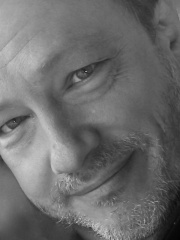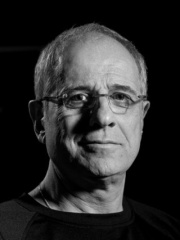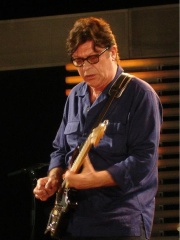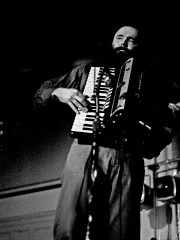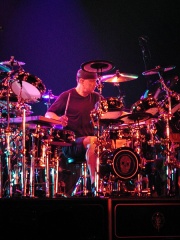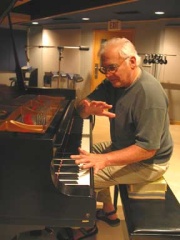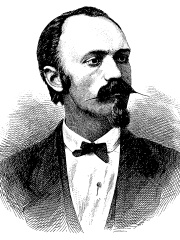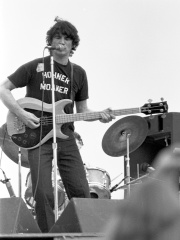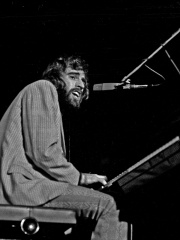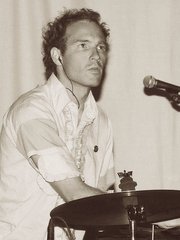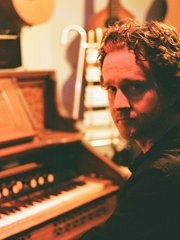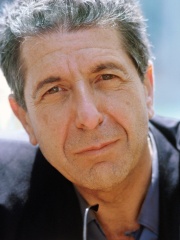
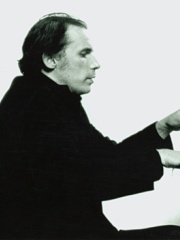
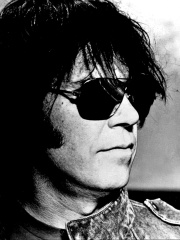


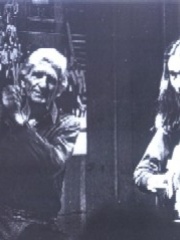
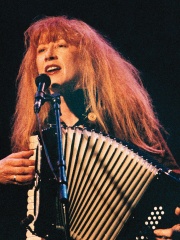
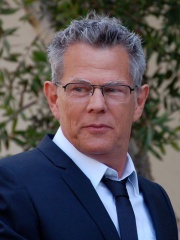
The Most Famous
MUSICIANS from Canada
Top 10
The following people are considered by Pantheon to be the top 10 most legendary Canadian Musicians of all time. This list of famous Canadian Musicians is sorted by HPI (Historical Popularity Index), a metric that aggregates information on a biography's online popularity. Visit the rankings page to view the entire list of Canadian Musicians.

1. Leonard Cohen (1934 - 2016)
With an HPI of 80.10, Leonard Cohen is the most famous Canadian Musician. His biography has been translated into 109 different languages on wikipedia.
Leonard Norman Cohen (September 21, 1934 – November 7, 2016) was a Canadian songwriter, singer, poet, and novelist. Themes commonly explored throughout his work include faith and mortality, isolation and depression, betrayal and redemption, social and political conflict, sexual and romantic love, desire, regret, and loss. He was inducted into the Canadian Music Hall of Fame, the Canadian Songwriters Hall of Fame, and the Rock and Roll Hall of Fame. He was invested as a Companion of the Order of Canada, the nation's highest civilian honour. In 2011, he received one of the Prince of Asturias Awards for literature and the ninth Glenn Gould Prize. In 2023, Rolling Stone named Cohen the 103rd-greatest singer. Cohen pursued a career as a poet and novelist during the 1950s and early 1960s, and did not begin a music career until 1966. His first album, Songs of Leonard Cohen (1967), was followed by three more albums of folk music: Songs from a Room (1969), Songs of Love and Hate (1971) and New Skin for the Old Ceremony (1974). His 1977 record Death of a Ladies' Man, co-written and produced by Phil Spector, was a move away from Cohen's previous minimalist sound. In 1979, Cohen returned with the more traditional Recent Songs, which blended his acoustic style with jazz, East Asian, and Mediterranean influences. Cohen's most famous song, "Hallelujah", was released on his seventh album, Various Positions (1984). I'm Your Man in 1988 marked Cohen's turn to synthesized productions. In 1992, Cohen released its follow-up, The Future, which had dark lyrics and references to political and social unrest. Cohen returned to music in 2001 with the release of Ten New Songs, a major hit in Canada and Europe. His eleventh album, Dear Heather, followed in 2004. In 2005, Cohen discovered that his manager had stolen most of his money and sold his publishing rights, prompting a return to touring to recoup his losses. Following a successful string of tours between 2008 and 2013, he released three albums in the final years of his life: Old Ideas (2012), Popular Problems (2014), and You Want It Darker (2016), the last of which was released three weeks before his death. His fifteenth studio album, Thanks for the Dance, was released in November 2019.

2. Glenn Gould (1932 - 1982)
With an HPI of 73.01, Glenn Gould is the 2nd most famous Canadian Musician. His biography has been translated into 47 different languages.
Glenn Herbert Gould (; né Gold; 25 September 1932 – 4 October 1982) was a Canadian classical pianist. Widely regarded as one of the greatest pianists of all time, he was renowned as an interpreter of the keyboard works of Johann Sebastian Bach. His playing was distinguished by remarkable technical proficiency and a capacity to articulate the contrapuntal texture of Bach's music. Gould rejected most of the Romantic piano literature by Chopin, Schumann, Liszt, Rachmaninoff, and others, in favour of Bach and Beethoven mainly, along with some late-Romantic and modernist composers. Gould also recorded works by Haydn, Mozart, and Brahms; pre-Baroque composers such as Jan Pieterszoon Sweelinck, William Byrd, and Orlando Gibbons; and 20th-century composers including Paul Hindemith, Arnold Schoenberg, Alexander Scriabin and Richard Strauss. Gould was also a writer and broadcaster, and dabbled in composing and conducting. He produced television programmes about classical music, in which he would speak and perform, or interact with an interviewer in a scripted manner. He made three musique concrète radio documentaries, collectively the Solitude Trilogy, about isolated areas of Canada. He was a prolific contributor to music journals, in which he discussed music theory. Gould was known for his eccentricities, ranging from his unorthodox musical interpretations and mannerisms at the keyboard to aspects of his lifestyle and behaviour. He disliked public performance, and stopped giving concerts at age 31 to concentrate on studio recording and media.

3. Neil Young (b. 1945)
With an HPI of 70.82, Neil Young is the 3rd most famous Canadian Musician. His biography has been translated into 65 different languages.
Neil Percival Young (born November 12, 1945) is a Canadian and American singer-songwriter. Son of journalist, sportswriter, and novelist Scott Young, Neil embarked on a music career in Winnipeg in the 1960s. Young moved to Los Angeles, forming the folk rock group Buffalo Springfield. Since the beginning of his solo career, often backed by the band Crazy Horse, he released critically acclaimed albums such as Everybody Knows This Is Nowhere (1969), After the Gold Rush (1970), Harvest (1972), On the Beach (1974), and Rust Never Sleeps (1979). He was also a part-time member of Crosby, Stills, Nash & Young, with whom he recorded the chart-topping 1970 album Déjà Vu. Young's deeply personal lyrics and signature high tenor singing voice define his long career. He also plays piano and harmonica on many albums, which frequently combine folk, rock, country and other musical genres. His often distorted electric guitar playing, especially with Crazy Horse, earned him the nickname "Godfather of Grunge" and led to his 1995 album Mirror Ball with Pearl Jam. More recently, he has been backed by Promise of the Real. Young directed (or co-directed) films using the pseudonym "Bernard Shakey", including Journey Through the Past (1973), Rust Never Sleeps (1979), Human Highway (1982), Greendale (2003), CSNY/Déjà Vu (2008), and Harvest Time (2022). He also contributed to the soundtracks of the films Philadelphia (1993) and Dead Man (1995). Young has received multiple Grammy and Juno Awards. The Rock and Roll Hall of Fame has inducted him twice: in 1995 as a solo artist and in 1997 as a member of Buffalo Springfield. In 2023, Rolling Stone ranked Young No. 30 on its list of the "250 Greatest Guitarists of All Time". Young is also on Rolling Stone's list of the 100 greatest musical artists, and 21 of his albums and singles have been certified gold or platinum in the U.S. Young was awarded the Order of Manitoba in 2006 and was made an Officer of the Order of Canada in 2009.

4. Joni Mitchell (b. 1943)
With an HPI of 67.96, Joni Mitchell is the 4th most famous Canadian Musician. Her biography has been translated into 64 different languages.
Roberta Joan Mitchell (née Anderson; born November 7, 1943) is a Canadian and American singer-songwriter, multi-instrumentalist, and painter. As one of the most influential singer-songwriters to emerge from the 1960s folk music circuit, Mitchell became known for her personal lyrics and unconventional compositions, which grew to incorporate elements of pop, jazz, rock, and other genres. Among her accolades are eleven Grammy Awards, and induction into the Rock and Roll Hall of Fame in 1997. Rolling Stone, in 2002, named her "one of the greatest songwriters ever", and AllMusic, in a 2011 biography, stated "Joni Mitchell may stand as the most important and influential female recording artist of the late 20th century." Mitchell began singing in small nightclubs in Saskatoon and throughout western Canada, before moving on to the nightclubs of Toronto. She moved to the United States and began touring in 1965. Some of her original songs ("Urge for Going", "Chelsea Morning", "Both Sides, Now", "The Circle Game") were first recorded by other singers, allowing her to sign with Reprise Records and record her debut album, Song to a Seagull, in 1968. Settling in Southern California, Mitchell helped define an era and a generation with popular songs such as "Big Yellow Taxi" and "Woodstock" (both 1970). Her 1971 album Blue is often cited as one of the greatest albums of all time; it was rated the 30th best album ever made in Rolling Stone's 2003 list of the "500 Greatest Albums of All Time", rising to number 3 in the 2020 edition. In 2000, The New York Times chose Blue as one of the 25 albums that represented "turning points and pinnacles in 20th-century popular music". NPR ranked Blue number 1 on a 2017 list of the "Greatest Albums Made By Women". Mitchell began exploring more jazz-influenced ideas on 1974's Court and Spark, which featured the radio hits "Help Me" and "Free Man in Paris" and became her best-selling album. Mitchell's vocal range began to shift from mezzo-soprano to that of a wide-ranging contralto around 1975. Her distinctive piano and open-tuned guitar compositions also grew more harmonically and rhythmically complex as she melded jazz with rock and roll, R&B, classical music and non-Western beats. Starting in the mid-1970s, she began working with noted jazz musicians including Jaco Pastorius, Tom Scott, Wayne Shorter, Herbie Hancock, and Pat Metheny as well as Charles Mingus, who asked her to collaborate on his final recordings. She later turned to pop and electronic music and engaged in political protest. She was awarded the Grammy Lifetime Achievement Award in 2002. Mitchell produced or co-produced most of her albums and designed most of her own album covers, describing herself as a "painter derailed by circumstance". A critic of the music industry, she quit touring and released her 19th and last album of original songs in 2007. She gave occasional interviews and made appearances to speak on various causes over the next two decades, though the rupture of a brain aneurysm in 2015 led to a long period of recovery and therapy. A series of retrospective compilations were released over this time period, culminating in the Joni Mitchell Archives, a project to publish much of the unreleased material from her long career. She returned to public appearances in 2021, accepting several awards in person, including a Kennedy Center Honor. Mitchell returned to live performance with an unannounced show at the June 2022 Newport Folk Festival and has made several other appearances since, including headlining shows in 2023 and 2024.
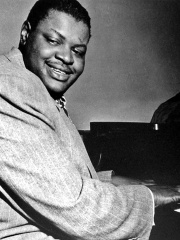
5. Oscar Peterson (1925 - 2007)
With an HPI of 67.41, Oscar Peterson is the 5th most famous Canadian Musician. His biography has been translated into 51 different languages.
Oscar Emmanuel Peterson (August 15, 1925 – December 23, 2007) was a Canadian jazz pianist and composer. As a virtuoso who is considered to be one of the greatest jazz pianists of all time, Peterson released more than 200 recordings, won eight Grammy Awards, as well as a lifetime achievement award from the Recording Academy, and received numerous other awards and honours. He played thousands of concerts worldwide in a career lasting more than 60 years. He was called the "Maharaja of the keyboard" by Duke Ellington, simply "O.P." by his friends, and was informally known in the jazz community as "the King of inside swing". Peterson worked in duos with Sam Jones, Niels-Henning Ørsted Pedersen, Joe Pass, Irving Ashby, Count Basie, and Herbie Hancock. He considered the trio with Ray Brown and Herb Ellis "the most stimulating" and productive setting for public performances and studio recordings. In the early 1950s, he began performing with Brown and drummer Charlie Smith as the Oscar Peterson Trio. Shortly afterward Smith was replaced by guitarist Irving Ashby, who had been a member of the Nat King Cole Trio. Ashby, who was a swing guitarist, was soon replaced by Barney Kessel. Their last recording, On the Town with the Oscar Peterson Trio (1958), recorded live at the Town Tavern in Toronto, was said to have captured a remarkable degree of emotional as well as musical understanding among three players. Peterson won eight Grammy Awards during his lifetime between 1975 and 1997. He is considered among the best jazz pianists and jazz improvisers of the twentieth century.

6. Avril Lavigne (b. 1984)
With an HPI of 63.71, Avril Lavigne is the 6th most famous Canadian Musician. Her biography has been translated into 124 different languages.
Avril Ramona Lavigne ( AV-ril lə-VEEN; French: [avʁil ʁamɔna laviɲ]; born September 27, 1984) is a Canadian singer and songwriter. She is a key musician in popularizing pop-punk music, as she paved the way for female-driven, punk-influenced pop music in the early 2000s. Her accolades include ten Juno Awards and eight Grammy Awards nominations. At age 16, Lavigne signed a two-album recording contract with Arista Records. Her debut album, Let Go (2002), is the best-selling album of the 21st century by a Canadian artist. It yielded the successful singles "Complicated" and "Sk8er Boi", which emphasized a skate punk persona and earned her the titles of "Pop-Punk Queen", "Pop-Punk Princess" and "Teen-Pop Slayer" from music publications. Her second album, Under My Skin (2004), became Lavigne's first to reach the top of the Billboard 200 chart in the United States, going on to sell 10 million copies worldwide. Lavigne's third album, The Best Damn Thing (2007), reached number one in seven countries worldwide and saw the international success of its lead single "Girlfriend", which became her first single to reach the top of the Billboard Hot 100 in the United States. Her next two albums, Goodbye Lullaby (2011) and Avril Lavigne (2013), saw continued commercial success and were both certified gold in Canada, the United States, and other territories. After releasing her sixth album, Head Above Water (2019), she returned to her pop punk roots with her seventh album, Love Sux (2022).

7. Gil Evans (1912 - 1988)
With an HPI of 62.19, Gil Evans is the 7th most famous Canadian Musician. His biography has been translated into 27 different languages.
Ian Ernest Gilmore Evans (né Green; May 13, 1912 – March 20, 1988) was a Canadian–American jazz pianist, arranger, composer and bandleader. He is widely recognized as one of the greatest orchestrators in jazz, playing an important role in the development of cool jazz, modal jazz, free jazz, and jazz fusion. He is best known for his acclaimed collaborations with Miles Davis.

8. Loreena McKennitt (b. 1957)
With an HPI of 62.16, Loreena McKennitt is the 8th most famous Canadian Musician. Her biography has been translated into 40 different languages.
Loreena McKennitt (born February 17, 1957) is a Canadian singer-songwriter, multi-instrumentalist, and composer who writes, records, and performs world music with Celtic and Middle Eastern influences. McKennitt is known for her refined and clear soprano vocals. She has sold more than 16 million records worldwide.

9. David Foster (b. 1949)
With an HPI of 61.64, David Foster is the 9th most famous Canadian Musician. His biography has been translated into 40 different languages.
David Walter Foster (born November 1, 1949) is a Canadian record producer, composer, arranger, and musician. He has won 16 Grammy Awards from 45 nominations. He is one of the few artists who consistently produced popular hit music over four decades: the 1970s, 1980s, 1990s, and 2000s. Foster has contributed to material for prominent music industry artists across various genres. Some of the notable songs he has been involved with include: "I Will Always Love You," "I Have Nothing," "The Prayer," "After the Love Has Gone," "Hard to Say I'm Sorry," "Hard Habit to Break," "The Love Theme from St. Elmo's Fire," "Glory of Love," "Winter Games," "Grown-Up Christmas List," "Best of Me," "Somewhere," and “Wildflower.” Foster served as senior vice president of Warner Music Group from 1997, then he chaired Verve Records from 2012 to 2016. In recent years, Foster composed Boop! The Musical, which premiered in Chicago in 2023 and debuted on Broadway in 2025. He was nominated for a Drama Desk Award for Outstanding Music.
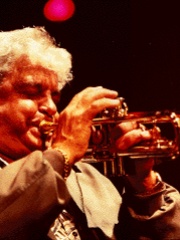
10. Maynard Ferguson (1928 - 2006)
With an HPI of 61.03, Maynard Ferguson is the 10th most famous Canadian Musician. His biography has been translated into 30 different languages.
Walter Maynard Ferguson CM (May 4, 1928 – August 23, 2006) was a Canadian jazz trumpeter and bandleader. He came to prominence in Stan Kenton's orchestra before forming his own big band in 1957. He was noted for his bands, which often served as stepping stones for up-and-coming talent, his versatility on several instruments, and his ability to play in a high register.
People
Pantheon has 63 people classified as Canadian musicians born between 1842 and 1995. Of these 63, 45 (71.43%) of them are still alive today. The most famous living Canadian musicians include Neil Young, Joni Mitchell, and Avril Lavigne. The most famous deceased Canadian musicians include Leonard Cohen, Glenn Gould, and Oscar Peterson. As of April 2024, 6 new Canadian musicians have been added to Pantheon including Chilly Gonzales, Logan Mader, and Sook-Yin Lee.
Living Canadian Musicians
Go to all RankingsNeil Young
1945 - Present
HPI: 70.82
Joni Mitchell
1943 - Present
HPI: 67.96
Avril Lavigne
1984 - Present
HPI: 63.71
Loreena McKennitt
1957 - Present
HPI: 62.16
David Foster
1949 - Present
HPI: 61.64
Deadmau5
1981 - Present
HPI: 60.61
Diana Krall
1964 - Present
HPI: 58.63
Geddy Lee
1953 - Present
HPI: 56.44
Bob Rock
1954 - Present
HPI: 56.11
Marc-André Hamelin
1961 - Present
HPI: 55.89
Bob Ezrin
1949 - Present
HPI: 55.82
Alex Lifeson
1953 - Present
HPI: 55.53
Deceased Canadian Musicians
Go to all RankingsLeonard Cohen
1934 - 2016
HPI: 80.10
Glenn Gould
1932 - 1982
HPI: 73.01
Oscar Peterson
1925 - 2007
HPI: 67.41
Gil Evans
1912 - 1988
HPI: 62.19
Maynard Ferguson
1928 - 2006
HPI: 61.03
Robbie Robertson
1943 - 2023
HPI: 60.52
Garth Hudson
1937 - 2025
HPI: 59.69
Neil Peart
1952 - 2020
HPI: 59.45
Paul Bley
1932 - 2016
HPI: 57.42
Calixa Lavallée
1842 - 1891
HPI: 55.75
Rick Danko
1943 - 1999
HPI: 55.71
Richard Manuel
1943 - 1986
HPI: 54.85
Newly Added Canadian Musicians (2025)
Go to all RankingsChilly Gonzales
1972 - Present
HPI: 49.00
Logan Mader
1970 - Present
HPI: 42.66
Sook-Yin Lee
HPI: 40.43
Dan Snaith
1978 - Present
HPI: 39.26
Greg Wells
1968 - Present
HPI: 35.80
Cirkut
1986 - Present
HPI: 34.73
Overlapping Lives
Which Musicians were alive at the same time? This visualization shows the lifespans of the 18 most globally memorable Musicians since 1700.





